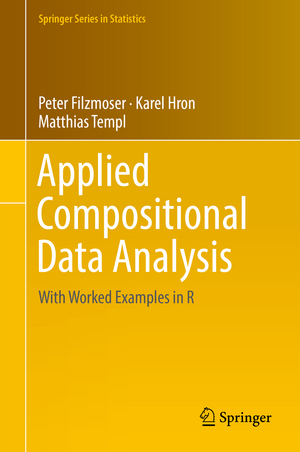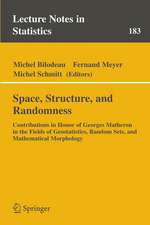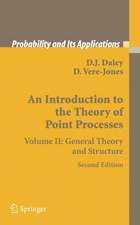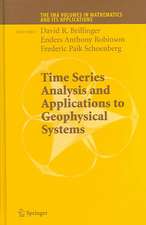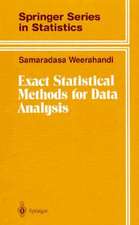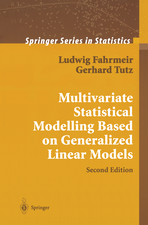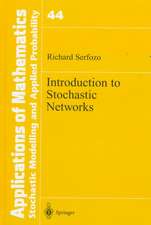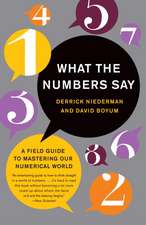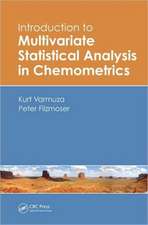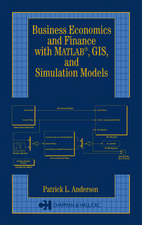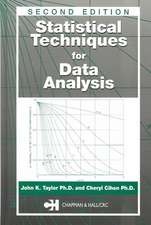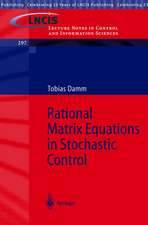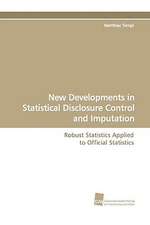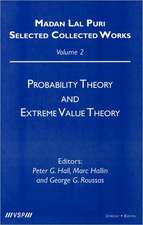Applied Compositional Data Analysis: With Worked Examples in R: Springer Series in Statistics
Autor Peter Filzmoser, Karel Hron, Matthias Templen Limba Engleză Hardback – 13 noi 2018
Din seria Springer Series in Statistics
- 14%
 Preț: 679.60 lei
Preț: 679.60 lei - 20%
 Preț: 630.97 lei
Preț: 630.97 lei - 20%
 Preț: 816.43 lei
Preț: 816.43 lei - 20%
 Preț: 1000.84 lei
Preț: 1000.84 lei -
 Preț: 390.84 lei
Preț: 390.84 lei - 20%
 Preț: 697.13 lei
Preț: 697.13 lei - 20%
 Preț: 445.20 lei
Preț: 445.20 lei - 20%
 Preț: 881.51 lei
Preț: 881.51 lei - 18%
 Preț: 1237.14 lei
Preț: 1237.14 lei - 18%
 Preț: 967.22 lei
Preț: 967.22 lei - 18%
 Preț: 956.50 lei
Preț: 956.50 lei - 18%
 Preț: 794.25 lei
Preț: 794.25 lei - 15%
 Preț: 648.05 lei
Preț: 648.05 lei - 18%
 Preț: 1222.49 lei
Preț: 1222.49 lei - 15%
 Preț: 646.11 lei
Preț: 646.11 lei - 15%
 Preț: 647.08 lei
Preț: 647.08 lei - 15%
 Preț: 646.11 lei
Preț: 646.11 lei - 18%
 Preț: 1389.62 lei
Preț: 1389.62 lei - 15%
 Preț: 652.81 lei
Preț: 652.81 lei - 18%
 Preț: 1114.52 lei
Preț: 1114.52 lei - 18%
 Preț: 952.40 lei
Preț: 952.40 lei - 18%
 Preț: 1393.27 lei
Preț: 1393.27 lei - 18%
 Preț: 1561.68 lei
Preț: 1561.68 lei - 18%
 Preț: 1231.47 lei
Preț: 1231.47 lei - 15%
 Preț: 513.64 lei
Preț: 513.64 lei - 18%
 Preț: 893.71 lei
Preț: 893.71 lei - 15%
 Preț: 649.87 lei
Preț: 649.87 lei - 18%
 Preț: 1007.65 lei
Preț: 1007.65 lei - 18%
 Preț: 1111.67 lei
Preț: 1111.67 lei - 18%
 Preț: 1229.10 lei
Preț: 1229.10 lei - 18%
 Preț: 892.74 lei
Preț: 892.74 lei - 18%
 Preț: 913.26 lei
Preț: 913.26 lei - 18%
 Preț: 943.88 lei
Preț: 943.88 lei -
 Preț: 391.61 lei
Preț: 391.61 lei -
 Preț: 391.22 lei
Preț: 391.22 lei - 18%
 Preț: 1391.04 lei
Preț: 1391.04 lei -
 Preț: 390.84 lei
Preț: 390.84 lei - 18%
 Preț: 893.84 lei
Preț: 893.84 lei - 18%
 Preț: 960.61 lei
Preț: 960.61 lei - 18%
 Preț: 1245.34 lei
Preț: 1245.34 lei - 18%
 Preț: 964.54 lei
Preț: 964.54 lei - 15%
 Preț: 643.16 lei
Preț: 643.16 lei - 18%
 Preț: 1674.70 lei
Preț: 1674.70 lei - 15%
 Preț: 643.84 lei
Preț: 643.84 lei - 15%
 Preț: 586.37 lei
Preț: 586.37 lei - 18%
 Preț: 1004.99 lei
Preț: 1004.99 lei - 15%
 Preț: 643.34 lei
Preț: 643.34 lei - 18%
 Preț: 806.40 lei
Preț: 806.40 lei - 18%
 Preț: 727.66 lei
Preț: 727.66 lei
Preț: 787.29 lei
Preț vechi: 960.11 lei
-18% Nou
Puncte Express: 1181
Preț estimativ în valută:
150.67€ • 155.65$ • 125.39£
150.67€ • 155.65$ • 125.39£
Carte tipărită la comandă
Livrare economică 26 martie-09 aprilie
Preluare comenzi: 021 569.72.76
Specificații
ISBN-13: 9783319964201
ISBN-10: 3319964208
Pagini: 325
Ilustrații: XVII, 280 p. 74 illus., 57 illus. in color.
Dimensiuni: 155 x 235 x 18 mm
Greutate: 0.59 kg
Ediția:1st ed. 2018
Editura: Springer International Publishing
Colecția Springer
Seria Springer Series in Statistics
Locul publicării:Cham, Switzerland
ISBN-10: 3319964208
Pagini: 325
Ilustrații: XVII, 280 p. 74 illus., 57 illus. in color.
Dimensiuni: 155 x 235 x 18 mm
Greutate: 0.59 kg
Ediția:1st ed. 2018
Editura: Springer International Publishing
Colecția Springer
Seria Springer Series in Statistics
Locul publicării:Cham, Switzerland
Cuprins
Preface.- Acknowledgements.- Compositional data as a methodological concept.- Analyzing compositional data using R.- Geometrical properties of compositional data.- Exploratory data analysis and visualization.- First steps for a statistical analysis.- Cluster analysis.- Principal component analysis.- Correlation analysis.- Discriminant analysis.- Regression analysis.- Methods for high-dimensional compositional data.- Compositional tables.- Preprocessing issues.- Index.-
Recenzii
“Its great advantage is that it is very well written, easy to follow, very didactical, and self-contained. Its great advantage is that it is very well written, easy to follow, very didactical, and self-contained. … I would definitely recommend researchers to use this book, but they should be aware that compositional data analysis is not just based on simple transformations.” (Vera Pawlowsky-Glahn, Statistical Papers, Vol. 61, 2020)
“Its easy-to-read format and didactic layout are designed for researchers from different fields. … Applied Compositional Data Analysis is a nice book for scholars because it offers a wide spectrum of different types of statistical analysis.” (Jan Graffelman and Josep Antoni Martín-Fernández, Biometrical Journal, Vol. 62, 2020)
“The book is appropriate for graduate students with a basic statistical background as an introductory book to compositional data analysis using R as non-beginners. It can also be successfully used by PhD students, researchers and teachers requiring a consistent and through reference.” (Márta Ladányi, ISCB News, Vol. 68, December, 2019)
“Its easy-to-read format and didactic layout are designed for researchers from different fields. … Applied Compositional Data Analysis is a nice book for scholars because it offers a wide spectrum of different types of statistical analysis.” (Jan Graffelman and Josep Antoni Martín-Fernández, Biometrical Journal, Vol. 62, 2020)
“The book is appropriate for graduate students with a basic statistical background as an introductory book to compositional data analysis using R as non-beginners. It can also be successfully used by PhD students, researchers and teachers requiring a consistent and through reference.” (Márta Ladányi, ISCB News, Vol. 68, December, 2019)
Notă biografică
Peter Filzmoser is a Professor of Statistics at the Vienna University of Technology, Austria. He received his Ph.D. and postdoctoral lecture qualification from the same university. He was a Visiting Professor at Toulouse, France and Belarus. Furthermore, he has authored more than 200 research articles and several R packages and is a co-author of a book on multivariate methods in chemometrics (CRC Press, 2009) and on analyzing environmental data (Wiley, 2008).
Karel Hron is an Associate Professor at Palacký University in Olomouc, Czech Republic. He holds a Ph.D. in applied mathematics and is active in promoting his discipline. His research activities focus on statistical analysis of compositional data and multivariate statistical analysis in general. His methods and algorithms are implemented in the statistical software R. He primarily collaborates with researchers from chemometrics and environmental sciences.
Matthias Templ is alecturer at the Zurich University of Applied Sciences, Switzerland. His main research interests include computational statistics, statistical modeling and official statistics. He is author of several R packages, such as the R package sdcMicro for statistical disclosure control, the simPop package for simulation of synthetic data, the VIM package for visualization and imputation of missing values and the package robCompositions for robust analysis of compositional data. He is author of the books Statistical Simulation in Data Science with R (Packt, 2016) and Statistical Disclosure Control (Springer, 2017).
Karel Hron is an Associate Professor at Palacký University in Olomouc, Czech Republic. He holds a Ph.D. in applied mathematics and is active in promoting his discipline. His research activities focus on statistical analysis of compositional data and multivariate statistical analysis in general. His methods and algorithms are implemented in the statistical software R. He primarily collaborates with researchers from chemometrics and environmental sciences.
Matthias Templ is alecturer at the Zurich University of Applied Sciences, Switzerland. His main research interests include computational statistics, statistical modeling and official statistics. He is author of several R packages, such as the R package sdcMicro for statistical disclosure control, the simPop package for simulation of synthetic data, the VIM package for visualization and imputation of missing values and the package robCompositions for robust analysis of compositional data. He is author of the books Statistical Simulation in Data Science with R (Packt, 2016) and Statistical Disclosure Control (Springer, 2017).
Textul de pe ultima copertă
This book presents the statistical analysis of compositional data using the log-ratio approach. It includes a wide range of classical and robust statistical methods adapted for compositional data analysis, such as supervised and unsupervised methods like PCA, correlation analysis, classification and regression. In addition, it considers special data structures like high-dimensional compositions and compositional tables. The methodology introduced is also frequently compared to methods which ignore the specific nature of compositional data. It focuses on practical aspects of compositional data analysis rather than on detailed theoretical derivations, thus issues like graphical visualization and preprocessing (treatment of missing values, zeros, outliers and similar artifacts) form an important part of the book. Since it is primarily intended for researchers and students from applied fields like geochemistry, chemometrics, biology and natural sciences, economics, and social sciences, all the proposed methods are accompanied by worked-out examples in R using the package robCompositions.
Caracteristici
Fills the gap in the existing literature by providing a practical approach to compositional data analysis Presents a concise and easy-to-interpret methodology which guarantees a scale invariant analysis of data carrying relative information Uses the log-ratio approach, including various aspects of data processing Includes numerous real-world examples with implementations in R from a wide range of applications
